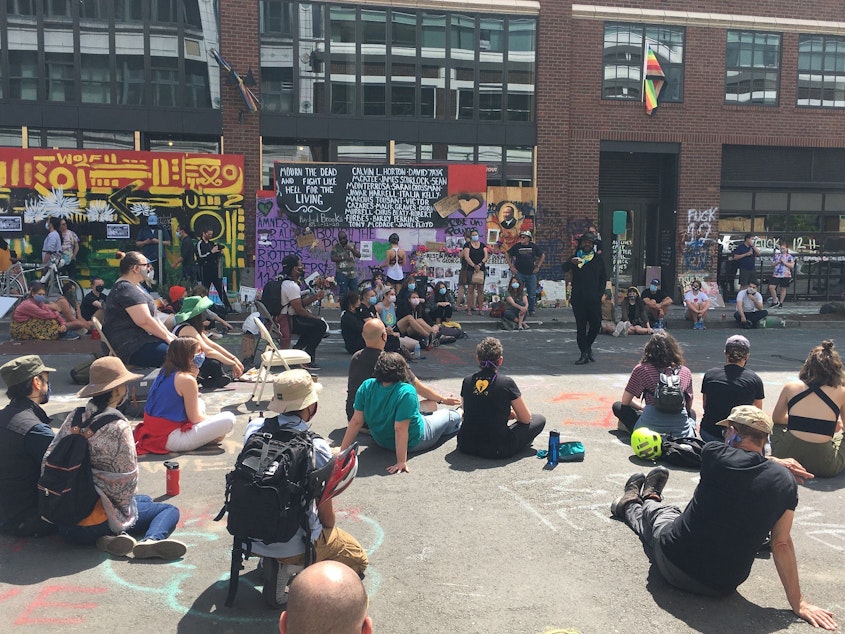Friday politics: Is the CHOP winding down?

The CHOP may be winding down, depending on who you ask. There is also a new lawsuit from residents and businesses in Capitol Hill over the protest zone. And all of this is happening as Washington state implements a new face mask mandate.
Joni Balter, host of “Civic Cocktail” on the Seattle Channel, and C.R. Douglas, political analyst for Q13 News joined KUOW’s Angela King to discuss.
Angela King: Does it seem that the CHOP has run out of gas? Although let's keep in mind there's a new group called the Black Collective Voice that says it’s staying put.
C.R. Douglas: Well, the biggest change is that the protesters have started to split into different factions. They've really lost the unity they began with, and it's hard to sustain things when that happens after that area became violent and other control many no longer wanted to be a part of it. And you see that same split in the larger community as well. I mean, there have been an increasing number of prominent Black voices starting to criticize the way CHOP has evolved. So once a movement starts to splinter over strategy and tactics, it's hard to keep up and that's fundamentally what's happening.
King: So Joni, there's a lawsuit that's adding pressure on the city to resolve the Capitol Hill situation. Business owners and residents say they want their neighborhood back, but they also profess solidarity with the overall goal of the protesters. So how does the city balance these competing interests?
Joni Balter: This is a really tough situation for everyone involved. No one looks good. No one. The city wanted to accommodate the autonomous area on a sort of free speech respect for public demonstration basis. But it was at the expense of the neighbors who are now suing. City leaders should not have been surprised. They should have better anticipated that things were going to turn ugly day after day, especially night after night, without police and firefighters inside the zone. The protesters in some ways answered their own question of whether you need police and fire. The answer is yes, you need both. You need 911 responders.
Sponsored
King: Who's going to gain politically at city hall from all of us?
Douglas: In terms of political gain, I would say at this point the protesters. Despite all the messiness and violence in that CHOP zone, if you just focus on the larger cause, the protesters have really moved the needle on their demands for police reform, while everyone else, including the mayor and SPD, have had to give some ground. Huge changes in just a few weeks. Everyone is now talking about radically reimagining how policing is funded and carried out. Everyone is now talking about big new commitments to communities of color. There's now a ban on tear gas, abandoned chokeholds. In very short order, these protests have achieved what many have been trying for years to get, and that's pretty remarkable.
King: Is CHOP kind of Mayor Jenny Durkan’s WTO moment?
Balter: It depends on what happens from here. She was fairly popular during the first part of her term, and especially during coronavirus, but a crisis like this prompts people to pay closer attention to their leadership. I'll give an example. I don't think her comment that we could have a Summer of Love worked very well. That one is headed to the bad quote Hall of Fame. She can recover, however, by finding a very careful balance between demands for dramatic change in policing and managing a city slogging through it, coronavirus and budget crisis. To be fair, the mayor is also hamstrung by some City Council members who fancy themselves more as activists than people who actually have to govern.
King: You brought up the coronavirus. So let's shift gears to the new face covering mandate. Coronavirus cases are increasing and we have that new mask requirement. But some sheriffs and other politicians are calling people who follow the orders "sheep."
Balter: The virus is talking to all of us. The governor is trying to be realistic. Many governors in southern and western states in particular have to be wondering if they opened their states too soon. Our Governor Inslee, who was so ahead of the curve on coronavirus also has to be wondering the same thing. Masks are easy and fairly effective. And they send this message that you are mindful of the health risks and you're trying to protect yourself and others
King: Some of Inslee’s opponents are vowing to disobey the order and are even mocking the idea. So how does this affect the 2020 governor's race and specifically Inslee’s bid for reelection?
Douglas: Well, mask politics is certainly raging in other areas of the country, where it's almost a litmus test for your politics. But I doubt it will get that kind of traction here in this race. Washington just isn't as evenly divided as a lot of other places. We’re overwhelmingly blue, and most seem willing to follow the Democratic governor on this. I mean, obviously, some will defy him, some won't wear them, but I doubt that that will be a sizable enough percentage of the population to make masks versus no mass, some big flashpoint in the governor's race. That being said, we do have some swing districts for State House and Senate where the politics is more evenly divided. And you know, this issue could have an effect there, where it takes fewer people to change an election outcome.




